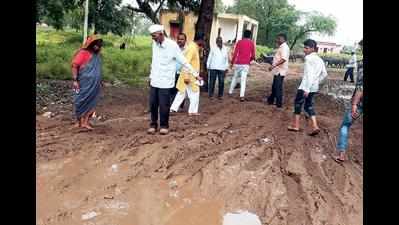Trending
This story is from October 22, 2019
Pune: Voters from rural, flood-hit areas rush to speak out
Rural voters braved rain and adverse conditions to step out to cast their votes, putting their urban counterparts to shame in many parts of the state.

Citizens trudge through the sludge to exercise their voting rights in rural Pune
PUNE: Rural voters braved rain and adverse conditions to step out to cast their votes, putting their urban counterparts to shame in many parts of the state.
Prime Minister Narendra Modi in his speeches in Mumbai and Pune had urged voters not to skip voting and travel. However, many electors seemed to have
Rural voting was significant in Kolhapur and Sangli districts that were ravaged by rains just two months ago.Electors from some of the worst-affected areas voted in large numbers. Despite being under water for nearly a week in August and recording rain again last week, their voting spirit was not dampened.
Karvir constituency recorded 83.20% voting, the highest in the state. In 2014 too, Karvir constituency had recorded the highest turnout in the state. The hilly terrain of Radhanagari also recorded 75.59%voter turnout.
Over the years, there has been a rising trend of urban voters taking advantage of voting day — when schools and some offices are shut — to take a short holiday, rather than stay back and vote. Political experts often blame the apathy of urban voters is blamed for pulling down the overall state turnout.
The urban pockets of Dhule ( 50.20%), Jalgaon (45.14%), Nashik central (49%) saw voting less than the state average. Similarly, voters from Pune and Mumbai also turned their backs on voting on Monday. Colaba in Mumbai and Shivajinagar in Pune recorded just 40.20% and 43.65% voting on Monday.
Political analysts said urban voters are indifferent to the assembly elections as most of their concerns are related to the civic level and their aspirations reflect at the national level. Moreover, the connect between the leaders in urban areas with the voters is far less compared to that in the rural areas.
“Most urban voters, mainly middle class, are away at work for five to six days a week and do not have to depend on the local leadership for their basic requirements. They even do not know the local MLA in many cases so the interest in voting is less,” an analyst said.
Prime Minister Narendra Modi in his speeches in Mumbai and Pune had urged voters not to skip voting and travel. However, many electors seemed to have
Rural voting was significant in Kolhapur and Sangli districts that were ravaged by rains just two months ago.Electors from some of the worst-affected areas voted in large numbers. Despite being under water for nearly a week in August and recording rain again last week, their voting spirit was not dampened.
Karvir constituency recorded 83.20% voting, the highest in the state. In 2014 too, Karvir constituency had recorded the highest turnout in the state. The hilly terrain of Radhanagari also recorded 75.59%voter turnout.
Similarly, the tribal dominated areas of Nandurbar district recorded a remarkably high voting percentage. Nawapur and Akkalkuwa constituencies reported 74.22% and 67.79% voting till on Monday.
Over the years, there has been a rising trend of urban voters taking advantage of voting day — when schools and some offices are shut — to take a short holiday, rather than stay back and vote. Political experts often blame the apathy of urban voters is blamed for pulling down the overall state turnout.
The urban pockets of Dhule ( 50.20%), Jalgaon (45.14%), Nashik central (49%) saw voting less than the state average. Similarly, voters from Pune and Mumbai also turned their backs on voting on Monday. Colaba in Mumbai and Shivajinagar in Pune recorded just 40.20% and 43.65% voting on Monday.
Political analysts said urban voters are indifferent to the assembly elections as most of their concerns are related to the civic level and their aspirations reflect at the national level. Moreover, the connect between the leaders in urban areas with the voters is far less compared to that in the rural areas.
“Most urban voters, mainly middle class, are away at work for five to six days a week and do not have to depend on the local leadership for their basic requirements. They even do not know the local MLA in many cases so the interest in voting is less,” an analyst said.
End of Article
FOLLOW US ON SOCIAL MEDIA










